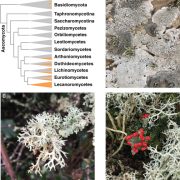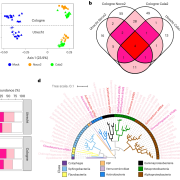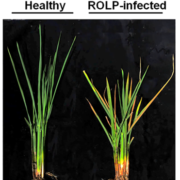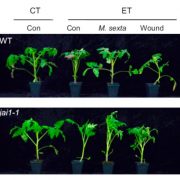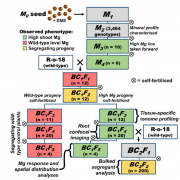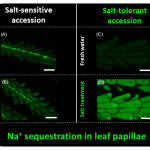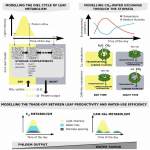Nitrate inhibits nodule organogenesis through inhibition of cytokinin biosynthesis in Lotus japonicus (bioRxiv)
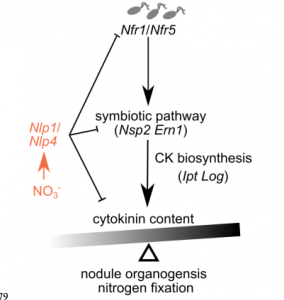 The symbiotic association between legumes and nitrogen-fixing rhizobia leads to the formation of nodules in roots, which supply nitrogen to the plant in low soil nitrate condition. In contrast, the presence of high nitrate reduces nodule formation. Cytokinin (CK) biosynthesis plays a major role in nodule organogenesis, but the impact of high nitrate on CK is still unknown. In this paper, Lin et al showed that the presence of high nitrate inhibits the expression of cytokinin biosynthesis genes. Further study on cytokinin biosynthesis mutants showed a reduction in cytokinin content, nodule number and nitrogenase activity in the presence of high nitrate. Additional study also showed nitrate inhibition of cytokinin signaling requires nitrate signaling genes like, NLP1 and NLP4. RNASeq analysis and gene expression analysis also showed NLPs mediating the nitrate regulation of early nodulation signaling genes like NFs. Overall, this study indicates a different cytokinin response to nitrate in legumes compared to non-legumes. Further study on NLPs and their role on regulating cytokinin and various NF signaling would help in optimizing nitrogen fixation in legumes and support efforts to develop symbiotic nitrogen fixation in non-legumes. (Summary by Sunita Pathak @psunita980) bioRxiv 10.1101/2020.11.03.366971
The symbiotic association between legumes and nitrogen-fixing rhizobia leads to the formation of nodules in roots, which supply nitrogen to the plant in low soil nitrate condition. In contrast, the presence of high nitrate reduces nodule formation. Cytokinin (CK) biosynthesis plays a major role in nodule organogenesis, but the impact of high nitrate on CK is still unknown. In this paper, Lin et al showed that the presence of high nitrate inhibits the expression of cytokinin biosynthesis genes. Further study on cytokinin biosynthesis mutants showed a reduction in cytokinin content, nodule number and nitrogenase activity in the presence of high nitrate. Additional study also showed nitrate inhibition of cytokinin signaling requires nitrate signaling genes like, NLP1 and NLP4. RNASeq analysis and gene expression analysis also showed NLPs mediating the nitrate regulation of early nodulation signaling genes like NFs. Overall, this study indicates a different cytokinin response to nitrate in legumes compared to non-legumes. Further study on NLPs and their role on regulating cytokinin and various NF signaling would help in optimizing nitrogen fixation in legumes and support efforts to develop symbiotic nitrogen fixation in non-legumes. (Summary by Sunita Pathak @psunita980) bioRxiv 10.1101/2020.11.03.366971


